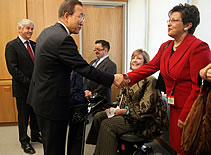Act Now

Empower U: Learn to Access Your Disability Rights Training on Canadian Human Rights, the Convention on the Rights of Persons with Disabilities (CRPD) and its Optional Protocol (OP) training aims to increase awareness of how to address discrimination using more familiar Canadian human rights laws such as Human Rights Codes and the newer international Convention on the Rights of Persons with Disabilities (CRPD). This is training for persons with disabilities by persons with disabilities. The training is part of a project funded by Employment and Social Development Canada and implemented by the Council of Canadians with Disabilities (CCD) in collaboration with Canadian Multicultural Disability Centre Inc. (CMDCI), Citizens With Disabilities – Ontario (CWDO), Manitoba League of Persons with Disabilities (MLPD) and National Educational Association of Disabled Students (NEADS). Read more.
Sign Up for our monthly digest
A monthly newsletter from CCD about what is happening in the community
International Day of Persons with Disabilities 2023
Related Documents
December 3, 2023
Opinion: It's time we made room for people with disabilities
June 6, 2023
UN Conference of State Parties: Connecting Disability Organizations
June 13, 2022
Canadian Civil Society Supports Dr. Laverne Jacobs for the UN Committee on the Rights of People with Disabilities
We join with everyone around the globe in recognizing International Day of Persons with Disabilities 2023.
The UN’s theme for this December 3rd is “United in action to rescue and achieve the Sustainable Development Goals for, with and by persons with disabilities”. We recall the disability community’s rallying cry during the development of the Convention on the Rights of Persons with Disabilities: Nothing About Us Without Us! Let’s remember that everything is about us which is why some people state Nothing without us!
As the UN Department of Economic and Social Affairs explains disability is mentionned in different parts of the Social Development Goals, specifically goals related to education, growth and employment, inequality, accessibility of human settlements, as well as data collection and monitoring of the SDGs. Some examples are as follows:
• Goal 4 on inclusive and equitable quality education and promotion of life-long learning opportunities for all focuses on eliminating gender disparities in education and ensuring equal access to all levels of education and vocational training for the vulnerable, including persons with disabilities. In addition, the proposal calls for building and upgrading education facilities that are child, disability and gender sensitive and also provide safe, non-violent, inclusive and effective learning environments for all.
• In Goal 8: to promote sustained, inclusive and sustainable economic growth, full and productive employment and decent work for all, the international community aims to achieve full and productive employment and decent work for all women and men, including for persons with disabilities, and equal pay for work of equal value.
• Closely linked is Goal 10, which strives to reduce inequality within and among countries by empowering and promoting the social, economic and political inclusion of all, including persons with disabilities.
• Goal 11 would work to make cities and human settlements inclusive, safe and sustainable. To realize this goal, Member States are called upon to provide access to safe, affordable, accessible and sustainable transport systems for all, improving road safety, notably by expanding public transport, with special attention to the needs of those in vulnerable situations, such as persons with disabilities. In addition, the proposal calls for providing universal access to safe, inclusive and accessible, green and public spaces, particularly for persons with disabilities.
• Goal 17 stresses that in order to strengthen the means of implementation and revitalize the global partnership for sustainable development, the collection of data and monitoring and accountability of the SDGs are crucial. Member States are called upon to enhance capacity-building support to developing countries, including least developed countries (LDCs) and small island developing states (SIDS), which would significantly increase the availability of high-quality, timely and reliable data that is also disaggregated by disability.
Everyone has a role to play in ensuring social and economic development is inclusive of persons with disabilities. December 3 is a time when we can all recommit to intensify our efforts concerning equity for persons with disabilities.

Canadian Foreign Minister Lawrence Cannon, far left, observes as U.N. Secretary-General Ban Ki-moon, second from left, meets members of the Canadian delegation including Steven Estey, center, with the Council of Canadians with Disabilities; Traci Walters, second from right, with Independent Living Canada; and the Canadian Association for Community Living President Bendina Miller, far right, at the United Nations in New York, Thursday March 11, 2010. Canada ratified the U.N. Convention on the Rights of Persons with Disabilities, a historic first international treaty that comprehensively recognizes the rights of persons with disabilities. (AP Photo/Bebeto Matthews)
